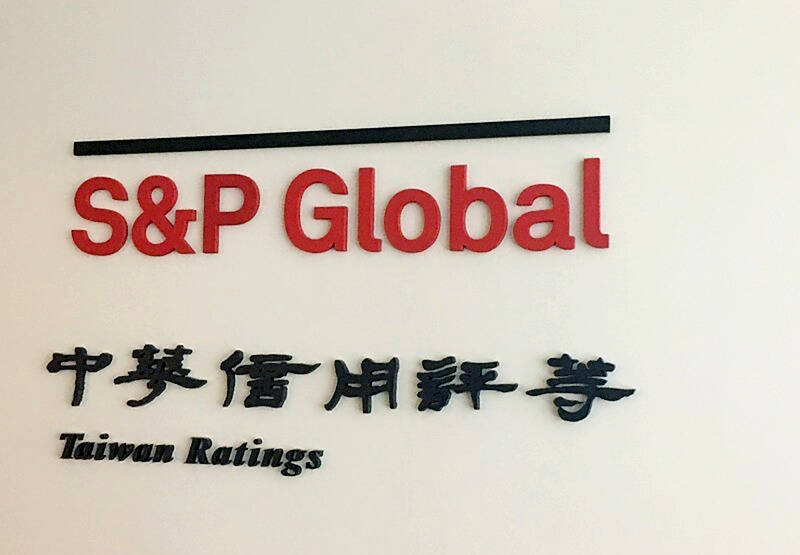The earnings ability of Taiwan’s top 50 corporations could continue to decline this year as the global economy is at risk of a hard landing, which has dampened their business, T Corp (中華信評) said yesterday.
The firms’ earnings before interest, taxes, depreciation and amortization (EBITDA), as well as profit margins, are continuing a downward trend due to the global economic slowdown and inventory adjustments, the local subsidiary of S&P Global Ratings said.
The situation might improve in the second half of this year due to a likely rebound in demand and inventory restocking, which should support earnings generation next year, Taiwan Ratings corporate credit analyst Raymond Hsu (許智清) said.

Photo: Clare Cheng, Taipei Times
In the tech sector, demand for smartphones, PCs and consumer electronics would remain weak, despite robust demand for artificial intelligence (AI) servers, Hsu said.
Inventory adjustments at semiconductor firms would continue longer than expected, with oversupply likely in the next three years after record investments in capacity, he said.
Next year, the top 50 companies’ EBITDA should recover to the level recorded last year, supported by the development of new technologies used in cloud services, electric vehicles and AI applications, Taiwan Ratings said.
As for the non-tech sector, chemical companies could see a limited recovery in product spreads and profitability due to soft demand, while the profit margins of cement makers would not recover by the end of this year, because of a slowdown in China’s property market, the agency said.
However, declining material costs would grow steelmaker’s buffer against tepid steel prices, and an increase in passenger demand and low oil prices could mitigate the erosion of airlines’ margins, Taiwan Ratings said.
In contrast, container shipping companies’ profits would contract severely after seaborne freight rates plunged to pre-COVID-19 levels, while automakers with less exposure to electric vehicles would underperform, it said.
Hopefully, telecoms would see improvements in revenue and earnings amid market consolidation, rising 5G adoption and reduced price competition, Taiwan Ratings said, adding that retailers might see moderate profit growth as the economy improves gradually.

When an apartment comes up for rent in Germany’s big cities, hundreds of prospective tenants often queue down the street to view it, but the acute shortage of affordable housing is getting scant attention ahead of today’s snap general election. “Housing is one of the main problems for people, but nobody talks about it, nobody takes it seriously,” said Andreas Ibel, president of Build Europe, an association representing housing developers. Migration and the sluggish economy top the list of voters’ concerns, but analysts say housing policy fails to break through as returns on investment take time to register, making the

‘SILVER LINING’: Although the news caused TSMC to fall on the local market, an analyst said that as tariffs are not set to go into effect until April, there is still time for negotiations US President Donald Trump on Tuesday said that he would likely impose tariffs on semiconductor, automobile and pharmaceutical imports of about 25 percent, with an announcement coming as soon as April 2 in a move that would represent a dramatic widening of the US leader’s trade war. “I probably will tell you that on April 2, but it’ll be in the neighborhood of 25 percent,” Trump told reporters at his Mar-a-Lago club when asked about his plan for auto tariffs. Asked about similar levies on pharmaceutical drugs and semiconductors, the president said that “it’ll be 25 percent and higher, and it’ll

NOT TO WORRY: Some people are concerned funds might continue moving out of the country, but the central bank said financial account outflows are not unusual in Taiwan Taiwan’s outbound investments hit a new high last year due to investments made by contract chipmaker Taiwan Semiconductor Manufacturing Co (TSMC, 台積電) and other major manufacturers to boost global expansion, the central bank said on Thursday. The net increase in outbound investments last year reached a record US$21.05 billion, while the net increase in outbound investments by Taiwanese residents reached a record US$31.98 billion, central bank data showed. Chen Fei-wen (陳斐紋), deputy director of the central bank’s Department of Economic Research, said the increase was largely due to TSMC’s efforts to expand production in the US and Japan. Investments by Vanguard International

WARNING SHOT: The US president has threatened to impose 25 percent tariffs on all imported vehicles, and similar or higher duties on pharmaceuticals and semiconductors US President Donald Trump on Wednesday suggested that a trade deal with China was “possible” — a key target in the US leader’s tariffs policy. The US in 2020 had already agreed to “a great trade deal with China” and a new deal was “possible,” Trump said. Trump said he expected Chinese President Xi Jinping (習近平) to visit the US, without giving a timeline for his trip. Trump also said that he was talking to China about TikTok, as the US seeks to broker a sale of the popular app owned by Chinese firm ByteDance Ltd (字節跳動). Trump last week said that he had